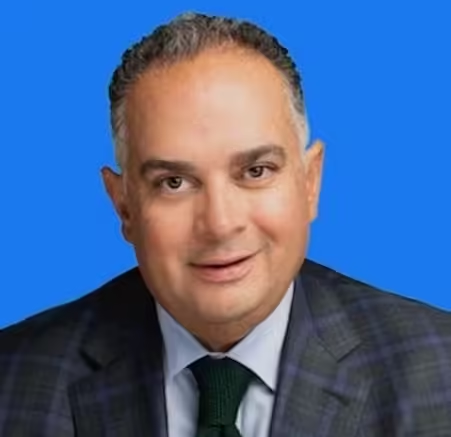“This is what real power looks like,” a member of a neo-Nazi group, Blood Tribe, wrote the day after Donald Trump spread their racist lies about Haitian immigrants in Springfield Ohio in the Sept 11 presidential debate with Kamala Harris.
In the course of not answering the question of why he killed a border security bill that would have put 1,500 more agents on the border, Trump falsely charged, “In Springfield, they’re eating the dogs. The people that came in. They’re eating the cats. They’re eating — they’re eating the pets of the people that live there.”
It was a lie so outrageous — and predictable — that debate moderator David Muir fact-checked it in real time, noting that Springfield’s city manager had told ABC News there were no credible reports of “pets being harmed, injured or abused by individuals within the immigrant community.” In fact, he’d told a staffer for Trump’s running, JD Vance, the exact same thing two days before the debate.
But Trump, typically, waved off any talk of verifiable facts, and fell back on his feeble “people say” routine, citing unnamed “people on television” saying “My dog was taken and used for food.”
After the debate, Blood Tribe leader Christopher Pohlhaus, proudly claimed credit on his Telegram channel, writing that Blood Tribe had “pushed Springfield into the public consciousness.”
But Blood Tribe is just one of several neo-Nazi groups formed while Trump was President. It owes much more to Trump than Trump owes to them. Trump kicked off his presidential campaign in 2015 by falsely claiming that Mexico was “sending” its criminals to the US. When tiki torch-carrying white supremacists clashed with anti-racist counter-protesters in Charlottesville, Virginia his first few months in office, Trump vehemently insisted there were “good people on both sides.” And he actively summoned similar groups to Washington on January 6, 2021, to help him try to steal the presidency, promising it would “be wild,” which indeed it was: as a result, five people died, Vice President Mike Pence narrowly escaped, 174 police officers were injured, and over a thousand Trump supporters were arrested.
Similarly, Trump’s debate lies sparked a wave of bomb threats — 36 in the first 24 hours alone, as the Ohio state police were called in to protect children returning to school.
“It induces panic and fear and depletes resources,” said city manager Bryan Heck told the Wall Street Journal… “We’re living the danger that misinformation and created stories lead to.”
Before the panic and chaos he created set in, the reality in Springfield was almost the exact opposite of what Trump and his running mate have portrayed, and local GOP leaders have repeatedly pushed back, as has Ohio GOP Governor Mike DeWine, who was born there.
“Springfield is having a resurgence in manufacturing and job creation. Some of that is thanks to the dramatic influx of Haitian migrants who have arrived in the city over the past three years to fill jobs,” DeWine wrote in the New York Times. “They are there legally. They are there to work.”
And while the post-COVID influx is more dramatically rapid, it typifies a much broader story that’ the exact opposite of what Trump and Vance claim: immigrants aren’t the problem — much less the threat — for the American heartland. They’re the solution.
“More than 1 million immigrants moved to the Midwest between 2000 and 2010, revitalizing stagnating cities across the region,” Sara McElmurry wrote for the Chicago Council on Global Affairs. “St. Louis owes nearly 40 percent of its population growth to immigration during that timeframe; the numbers are nearly 20 percent in Grand Rapids and 19 percent in Lincoln.” Immigrants not only fill the workforce, she noted, “immigrants are twice as likely as their native-born peers to start a business” as well.
And it’s not just aging big cities we’re talking about. Smaller cities and towns like Springfield have benefited as well. For example, in 2013 NPR reported, “Since 1980, when the first slaughterhouse was built in Garden City, Kan., the newcomers have doubled the population to roughly 30,000 and turned a white cow town into a cultural crossroads where minorities are now the majority.”
So, yes, millions in the region respond to Trump’s narratives of grievance and loss. But the region would be far poorer and less prosperous without the immigrant influx, which Trump and Vance wildly mischaracterize as an invasion, drawing on the conspiracist myth of the Great Replacement theory, whose originator, French conspiracy theorist Renaud Camus puts it very simply: “You have one people, and in the space of a generation you have a different people,” a formulation that equates immigration with genocide, and thus invites, if not demands genocidal violence in response.
A series of white supremacist mass murderers — from Norway to New Zealand to Buffalo, Pittsburgh, and El Paso—have issued Great Replacement-styled manifestos to justify their massacres, while former Fox News host Tucker Carlson mainstreamed this idea, promoting it in more than 400 episodes, and merging it with earlier GOP voter fraud myths to help drive what’s become a key theme of Trump’s 2024 campaign.
When challenged on his lies on CNN on Sept 15, Vance claimed he’d received firsthand from constituents, but the media ignored the problems, “until Donald Trump and I started talking about cat memes,” adding, “If I have to create stories so that the American media actually pays attention to the suffering of the American people, then that’s what I’m going to do.”
So he “has to” tell specific racist lies to promote broader ones.
Because the suffering of the American people is not at the hands of Haitian immigrants. “The local services are completely overwhelmed,” he said in that same CNN appearance. “Homelessness has gone up. Murders are up by 81% because of what Kamala Harris has allowed to happen to this small community.”
Just one problem, noted by Daniel Driscoll, the Republican top prosecutor in Clark County, where Springfield is located: “During the time that I’ve been with the prosecutor’s office, which is 21 years now, we have not had any murders involving the Haitian community – as either the victims or as the perpetrators.”
So the murder rate had nothing to do with Haitians, besides which, it was a one-year jump from five to nine, part of a pattern that’s fluctuated without a clear trend for more than a decade, according to a summary by PolitiFact, which generously rated Vance’s claim as “Mostly False.”
But there’s no good reason to be generous regarding Vance and Trump’s lies. They double down on their lies for good reason: it not only excites their base — flooding it with a sense of righteousness that can justify whatever Trump and Vance may choose to do in their name—it sets the agenda, distracting attention from other matters that would lead Americans as a whole to reject them convincingly.
Recall first that Trump pushed the cat-eating lie to distract from the fact that he was to blame for perpetuating the border chaos. He killed a bill to beef up border security, “Because he preferred to run on a problem instead of fixing a problem,” as Harris put it during the debate.
But that’s just the beginning. For decades, Democrats and Republicans have sparred over trying to craft a comprehensive immigration reform bill, that would both strengthen border security and legalize the status of millions of immigrants who’ve long been contributing members of their communities. The GOP’s Trump-led shift to the right has virtually drowned all such talk about a balanced comprehensive approach that recognizes the great value of immigration, even as it seeks to control it more rationally and compassionately.
As a result, a recent Scripps News/Ipsos poll found that 54% of Americans “strongly” or “somewhat support” a mass deportation policy, which would effectively “vaporize the economy” as one exerts, Michael Ettlinger put it in the Boston Globe. “What would happen if 22 percent of America’s farm workers vanished from the workforce?” he asked. Or 15 percent of construction workers? Or 8 percent of service and manufacturing workers? Or 6 percent of transportation workers. We’ve had mass deportations repeatedly over the past 100 years or so, though nothing on the scale of what Trump proposes. And as Ettlinger reviews, they’ve always hurt American workers and the economy as a result.
But just as the Trump/Vance pet-eating incitement stories blocked out the real story of how Haitian immigrants are helping Springfield thrive, the broader immigrant crisis narrative Trump has relentlessly feed blocks out the real story of how vital undocumented immigrants are to our nation’s economy.
Trump hasn’t done this alone, of course. He’s had plenty of help from the media that’s all to willing to let him set whatever agenda he wants, regardless of how many lies he tells in doing so. And thus we have the results of another recent NBC poll, showing Harris more trusted on a wide range of subjects and attributes—protecting immigrant rights (+28-points ), abortion (+21 points), having the necessary mental and physical health (+20 points), having the right temperament (+16 points) and representing change (+9 points)—but with Trump leading on three that could keep him in the race: securing the border (+21), the economy (+9) and dealing with the cost of living (+8). But none of those three advantages are based in reality. They’re all downstream of believing his false border crisis narrative, along with other big lies.
As already noted, Trump single-handedly blocked a border security law that Congress was poised to pass—because as Harris said, “he preferred to run on a problem instead of fixing” it. And that’s on top of the fact that he had four years as President to secure the border, and had nothing lasting to show for it. So the idea that he’d be better at securing the border is all based on bluster, not facts. But so, to are the ideas he’d be better on the economy or dealing with the cost of living. As just noted, his mass deportation policy would devastate the economy, and with it the cost of living as well.
To be clear, Springfield’s Haitian immigrants—who are here perfectly legally—are the prime targets of Trump’s most recent racist immigration lie. And undocumented immigrants in general are the prime targets of his broader lie. But all of us will suffer, either directly or indirectly, if he were to succeed and gain power again. That is what the real record of American immigration shows us—in Springfield over the past three years, in the Midwest more broadly since 2000, and in America as a whole throughout our history. The material record is clear: immigration makes us more prosperous, as well as richer in cultural diversity.
But the moral record should be clear as well—particularly for those who claim to believe America is a Christian nation. There’s Exodus: “Thou shalt neither vex a stranger nor oppress him, for ye were strangers in the land of Egypt.” There’s Matthew: “Whatever you did for one of the least of these brothers and sisters of mine, you did for me.”
And then there’s Martin Luther King, speaking both to the moral and the material, when he said, “You cannot keep a man down in the valley without staying down there with him.”










